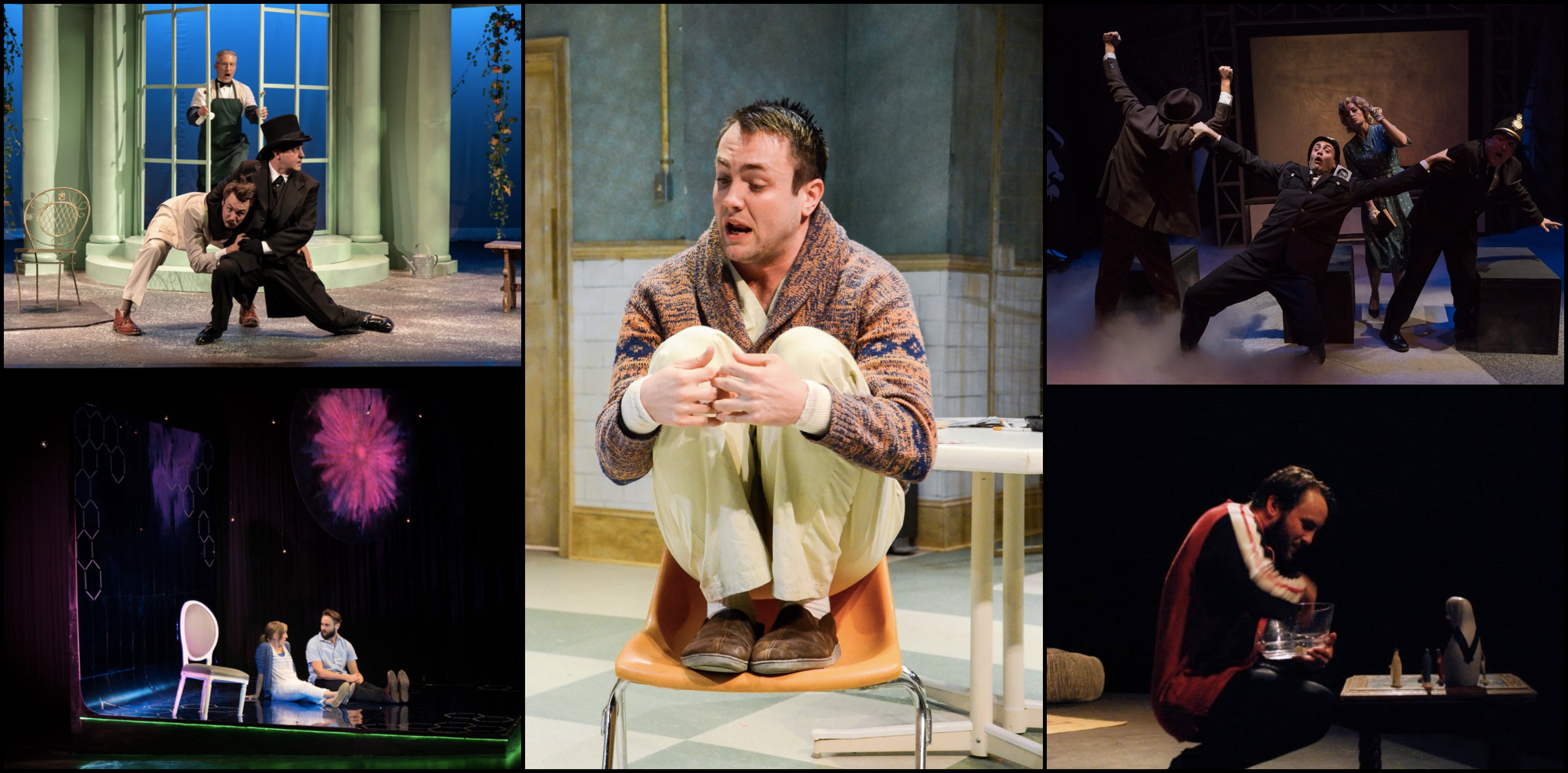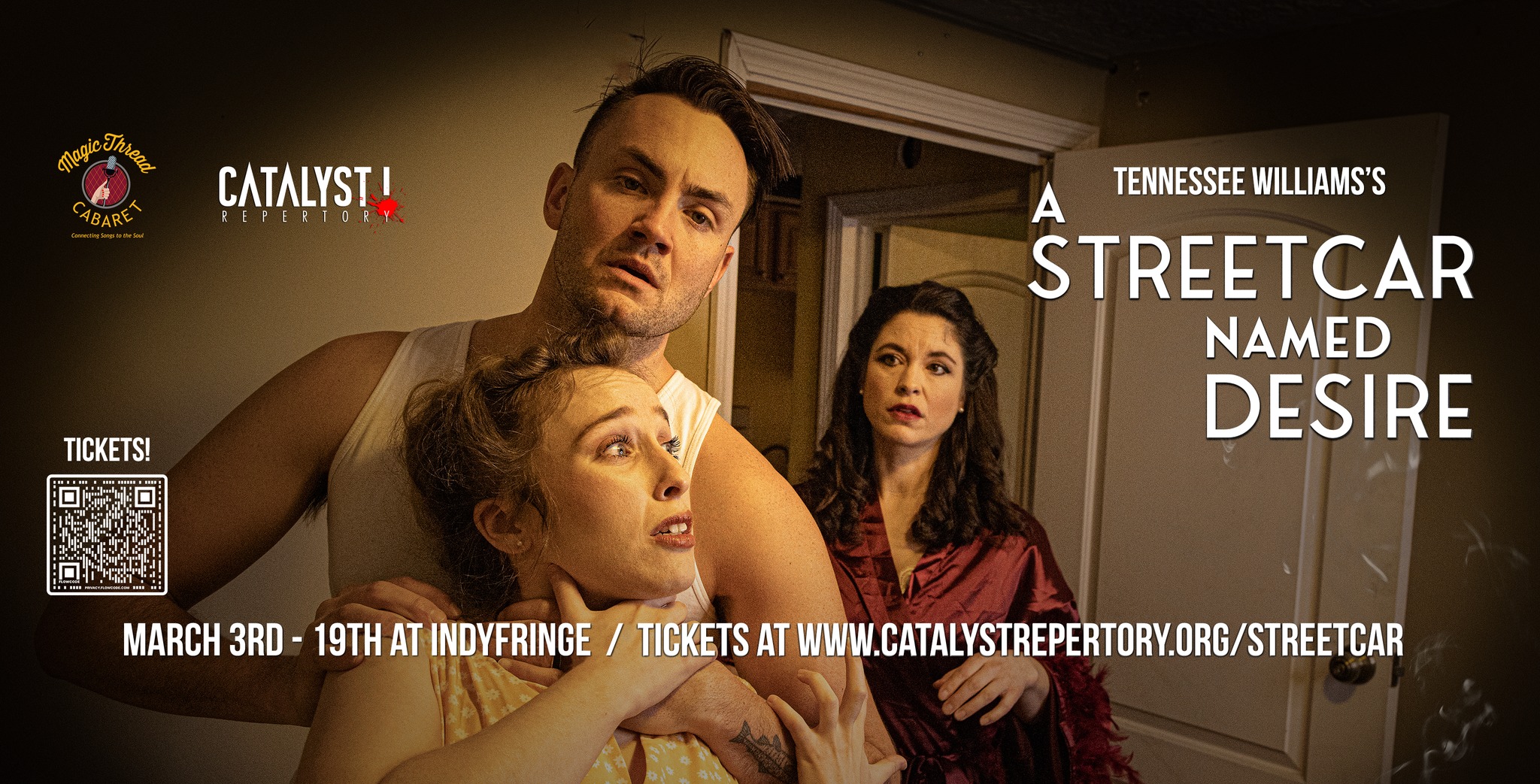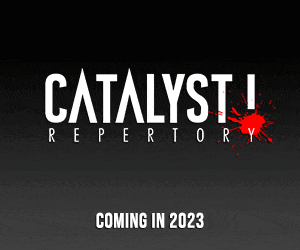
L-R Top row – Ian McCabe in “The Importance of Being Earnest” & “The 39 Steps.” Center- “Once Flew Over a Cuckoo’s Nest.” Bottom row – “Constellations” & “The Lonesome West.”
One of the greatest satisfactions I enjoy from covering the arts is that I get to do so from the unique perspective of someone who is himself an artist. In addition to writing, I am also a producer, director, filmmaker, playwright, and lyricist. Of all my pursuits, however, my first love is theatre. Having trained in acting, I find a tremendous joy in returning to the stage after a 30-year absence to appear in the role of Pablo Gonzales in “A Streetcar Named Desire.” A co-production of Catalyst Repertory and Magic Thread Cabaret (of which I am managing director), the Tennessee Williams classic is directed by Catalyst co-founder, Casey Ross. The production runs weekends, March 3-19 at the IndyFringe Basile Theatre
One of my greatest joys in participating in a play again has been the rehearsal process. With three weeks to go until opening night, the cast is deep into the process of bringing “Streetcar” to life. Part of that process involves interacting with other actors to create art. Of course, the experience also includes the bonding that takes place between fellow actors. Thus far, I have had the great pleasure of playing make-believe poker during Act 1, scene 3, and Act 2, scene 5, with Brian DeHeer, who plays Mitch, and Matt Kraft, who plays Steve. The fourth member of our posse is Ian McCabe, who plays the irascible Stanley Kowalski. All three of my colleagues are tremendous actors, but McCabe stands out for the leading man he is.
Besides his status as a performer, the 34-year-old McCabe is also a producer who has worked in the theatre for nearly 30 years. The Hoosier-native’s credits include productions with Lean Ensemble Theater of South Carolina, the Kaleidoscope Players of New Mexico, and Two Pigs Productions of Illinois. McCabe’s Indiana theatre credits include work with Cardinal Stage, the Bloomington Playwright’s Project, and Actors Theatre of Indiana. “Streetcar” marks his return to acting for the first time since 2019, when he participated in a stage reading.
Also a dedicated educator, McCabe’s day job is serving as kindergarten to 2nd grade dean at Circle City Prep on Indy’s far Eastside, where he is in charge of lower elementary discipline, behavior intervention, and positive behavior systems. Married to Abby, the couple moved to Indy from Nashville, TN, this past January.
Recently, I chatted with McCabe from his SoBro home. Below is an edited transcript of our conversation.

Ian McCabe – Courtesy of Tyler Core. Used with permmission.
Tell me your thoughts on Stanley Kowalski, and why the role appeals to you?
I started acting when I was six. And I love, love, love theatre and acting and then when you get into high school and start to get more serious about it and then you get into more serious theatre and works such as “A Streetcar Names Desire,” and you see Marlon Brando and you think “Oh, I want to play that part,” right? It’s like, I want to play Romeo in “Romeo and Juliet,” and I want to play Stanley in “Streetcar.” I want to do all these things. Actually, I never really wanted to play Romeo. I always wanted to play Tybalt. It was always fun for me to gravitate toward bad guys.
As far as Stanley, I initially had infatuation with this this role that is so iconic and now as I have gotten older, the beautiful thing about Stanley and playing him is finding the side of him I empathize with and finding the side of him that I can identify with and finding that truth in him. He’s not just an evil spouse-abusing alcoholic. We get this picture painted of Stanley Kowalski as this insidious force. And so for me, even when I read for it with Casey, I really wanted to find moments when I read with Anna as Stella where he is genuinely loving and flirty. And there is something about him that’s charming, and he genuinely does care about his family unit. Does he care about it in a in a particularly healthy way? But I cannot judge the character. I am not here to judge Stanley. I’m here to tell Stanley’s story and live in Stanley’s story for two hours and 45 minutes or whatever it is.
In your mind, what is Stanley’s back story?
I really wonder because there’s not a clear indication in the script as to where Stanley is from. I imagine he’s from an immigrant family. I would say he is – he’s a first generation Polish American. I did some reading and discovered that Tennessee Williams knew a man named Stanley Kowalski in Saint Louis. And so that’s why I’m trying to make, as much as possible, whatever accent is coming out of my mouth, I’m trying not to place it too specifically in any place or region. Because I imagine he is probably somebody who assimilated, based on the way he speaks, he is between his parents who are nonnative speakers and his community, which is one that is a mixed language one. Whatever he has developed through listening to radio and media to be successful in work, right? And so I think Stanley is a little bit of an amalgamation – vocally and physically of his surroundings – because like many of those first generation immigrant stories, he is incredibly driven to succeed in this world. When Stella hints that he’s got this drive that you can’t see, it doesn’t manifest in great manners. It doesn’t manifest in hospitality, but it manifests in his drive. He picked up a presentation of masculinity from Americanism along his way in the military and as a noncommissioned officer, as an enlisted person, which is pretty impressive. And when they talk about his job, he is clearly in sales and travels all the time. He started in the plant, and Mitch still works in the plant, and Stanley has worked his way into a position where he is making more money and working his way up the ladder. He probably comes from a difficult background, in a low-income family without means and has to do whatever he has to do to strive and succeed. He’s going to succeed. And there’s some toxicity caused by the fact that he was likely raised in a household where one or both of his parents were abusive, physically or emotionally manipulative, which Stanley does both of in the play. Those things don’t just come out of nowhere. They are inherited, they are seen, they’re adopted.
What do you make of Stanley’s relationship with Blanche?
I think what he sees in Balance is someone who is as dynamic, energetic, forceful, and manipulative as he is. For the longest time Stanley has always been the most magnetic person in the room. You know, of course, he’s going to excel over the other guys in the plant. He has just got that thing. He sees with Blanche someone who has lived the same way, and he has met his match, particularly in her relationship with Stella. He has met Stella away from her family. He has never met anyone in her family. He has been able to isolate and manipulate her as truly manipulative people do. He loves her and wants to protect her and keep her, so he has been able to exert his will on her. And because Stella is drawn to him, she goes along with him. And I think she grew up in that same cycle with Blanche. Stanley sees Blanch having some control over Stella that he has never seen and which threatens him. He’s threatened by the fact that Mitch has fallen in love with her and threatened by the fact that she is beautiful and has depth.
What themes are explored in the play?
I think Tennessee Williams wanted to talk about class and sexuality which were at the top of mind for him. He draws this beautiful portrait of Stanley as a working man climbing up by his boot straps. During Williams’s lifetime that was an idealized type, building up the country after the war, and he wanted to pick that apart a little bit. He spent his life being smothered by classist southern American culture, so with Blanche, he picks apart the façade of the plantation owning debutante who goes to Cotillions and sadly in the middle of it, you have Stella who just wants to live a good life and be happy with the man she loves and Mitch who is doing everything he can do to take care of his dying mother and good people who are somewhere in the middle, and they are the ones who get victimized, and they are the ones who get lost. Williams was also an incredibly sexual playwright, particularly for his time in the way he writes about Blanche’s husband, who was a closeted homosexual and suffered greatly from the rigid culture he lived in. Then, of course Williams endowed Blanche and Stanley with sexual energy. Williams played around with the rigidity and morality that surrounded sex at that time and wanted to portray his characters as humans that are complex and interesting and as sexual beings.
 How is the play relevant to modern audiences?
How is the play relevant to modern audiences?
Williams is a lyrical, classical writer from the mid-century. I think his work should be read like Shakespeare and read with the rhythm of his words. We live at a time when we are super divided in class structures in the U.S., and they create these invisible lines that are absolutely real. The class theme brings “Streetcar” totally into the now.
Let us shift to the production itself. What are your thoughts about the cast?
They are lovely. It’s a great group. Everybody is bringing a neat piece to the puzzle of it. It is not often that you get into a group of people who you feel really comfortable with immediately. At this point Sara and Anna and I have been at every rehearsal, and it’s been great to spend time with them. Everybody is open, willing, and daring and not afraid to make choices in the rehearsal room and have fun at the same time.
How is working with Casey Ross, the director?
We had such a fun time when we were undergrads together at Hanover. Now, it’s great to sit down with Casey because she’s a director who trusts actors. It is so cool to see her evolution as a director who is confident in herself, and the people she has chosen, to let us work. She doesn’t have to micromanage us or hammer us over the head with heavy handed direction. I can’t wait to see how the work evolves, once we are all blocked and we are delving deeper into some of the grittier moments. Right now it is so nice to see her working in such a fluid, smooth, ideal, democratic rehearsal process in which a director is both giving and receiving.
Do you have a sense that this production is special?
It’s hard not to when you have this particular play. This text is so good. The story that we have on our hands is just a gorgeous thing to carry in. To be the people responsible for that story is a great gift. I also love that we are doing it in the round. I also look forward to rekindling my Indianapolis theatre work.
For tickets and information about “A Streetcar Names Desire” visit catalystrepertory.org, magicthreadcabaret.com, or IndyFringe.org.
,,







